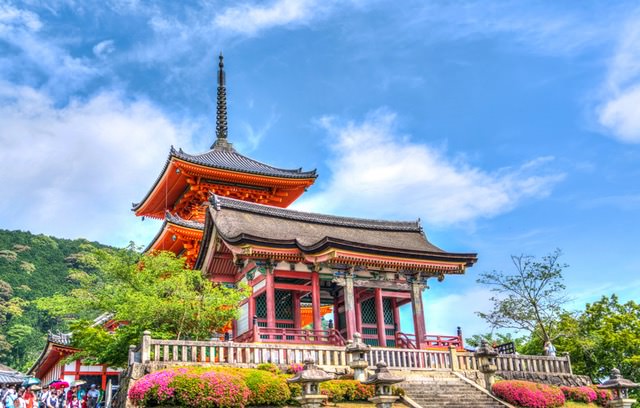Japan is known for its lively spring festivals such as the Dai Himonjiyaki (大ひもんじやき) in which a 1100 foot Chinese character symbolizing “fire” is set ablaze on the side of Mt. Aso or the Ose Matsuri (小瀬祭り) on the second Saturday in March where men, dressed as women, perform a lively dance atop boats in the harbor. Yet, for all of its glorious festivities, the Spring season starts off tranquilly with Shunbun no hi (春分の日) or the Vernal Equinox Day.
On the Vernal Equinox Day the sun rises exactly in the east and sets exactly in the west, making day and night equal in length. As plants begin to sprout and animals venture out of hibernation, the Japanese celebrate Vernal Equinox by honoring nature through observing the changes of the season. Traditionally, Shunbun no hi is preceded and precluded by the three days of Higan (彼岸), the Buddhist celebration of “the other shore” in which families come together to honor ancestors who have crossed over to the next stages of life.
During Higan it is traditional to make an offering of rice dumplings the three days before and after the Vernal Equinox. Many city dwellers use the holiday to return to their families and help clean their homes. The gravestones of loved ones are washed by hand and the flowers around the burial sites are replaced. During the Spring Equinox the Japanese honor their ancestors by offering botamochi (ぼたもち), a rice dumpling covered in sweet red bean paste, enjoyed after the memorial services.
Japanese customs span from tranquil appreciation to outlandish festivals. Although Vernal Equinox Day may not be as flashy as the other spring festivals, it is an important part of starting the spring season in Japan as well as cultivating a full understanding and appreciation of Japanese culture.
Sharon Schweitzer and Caitlyn Arnold co-wrote this post. Sharon Schweitzer, J.D., is a cross-cultural trainer, modern manners expert, and the founder of Protocol & Etiquette Worldwide. In addition to her accreditation in intercultural management from the HOFSTEDE centre, she serves as a Chinese Ceremonial Dining Etiquette Specialist in the documentary series Confucius was a Foodie, on Nat Geo People. She is the resident etiquette expert on two popular lifestyle shows: ABC Tampa Bay’s Morning Blend and CBS Austin’s We Are Austin. She is regularly quoted by BBC Capital, Investor’s Business Daily, Fortune, and the National Business Journals. Her Amazon #1 Best Selling book in International Business, Access to Asia: Your Multicultural Business Guide, now in its third printing, was named to Kirkus Reviews’ Best Books of 2015. She’s a winner of the British Airways International Trade Award at the 2016 Greater Austin Business Awards.
Caitlyn Arnold is a Spring 2017 cross-cultural communication intern at Protocol & Etiquette Worldwide. She is currently a senior at St. Edward’s University, majoring in Global Studies with concentrations in East Asia and International Security. Connect with Caitlyn on LinkedIn or follow her on Instagram.
Photo Pexels


Leave A Comment